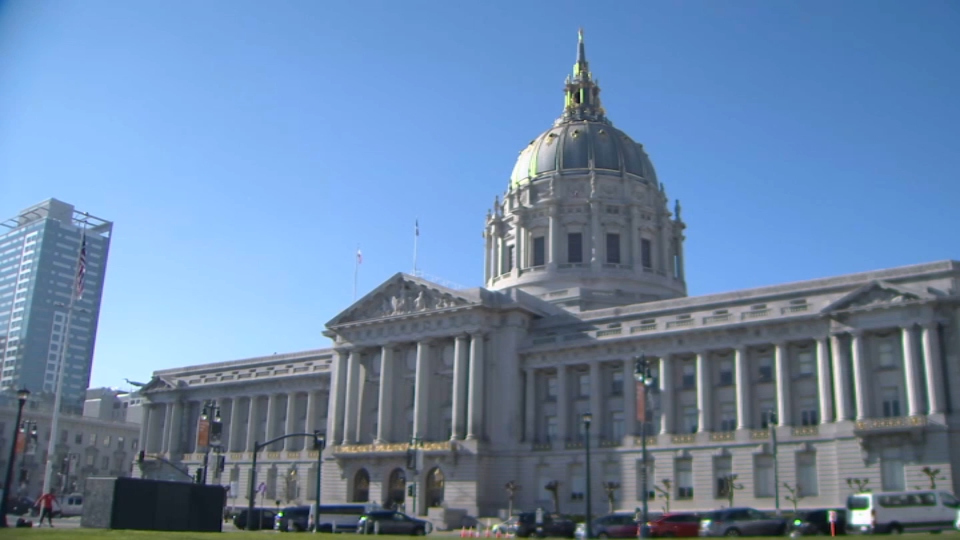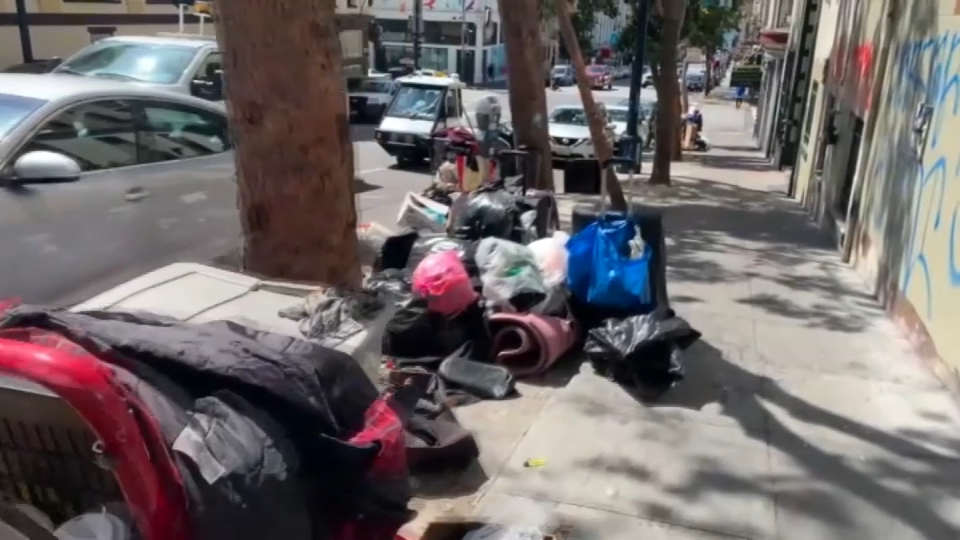A panel of federal appellate judges Wednesday heard contentious arguments about a much-debated court order that bars San Francisco from sweeping homeless encampments while there is a shortage of shelter beds in the city.
The appeal has attracted considerable public attention and rallies initiated by supporters of both sides began outside of the courthouse before the case was called and continued even after arguments were underway in the 9th U.S. Circuit Court of Appeals.
San Francisco has been vocal about the high stakes involved in the case. City Attorney David Chiu said the case is "being watched by cities and states, not just in California, but within the 9th Circuit and beyond."
At the close of more than an hour of arguments, the judges on the panel deemed the case "submitted" -- a term used to mean that they will issue a decision at a later date when their consideration is complete. However, comments from the bench suggested that they see a way to resolve at least some of the issues raised the city.
The injunction
The appeal comes in a lawsuit brought against the city by the Coalition on Homelessness, an advocacy group, and a number of individuals, including several who have experienced homelessness.
At the end of 2022, U.S. Chief Magistrate Judge Donna Ryu preliminarily enjoined the city from enforcing laws that barred "involuntarily" homeless individuals from sleeping on city streets while there was a shortage of beds to provide them shelter. The rationale was that prohibiting sleeping on the streets by someone who has no other option is "cruel and unusual" punishment under the Eighth Amendment.
San Francisco is experiencing a profound shortage of shelter beds, with more than 4,000 people sleeping in tents, cars or vacant buildings, according to testimony in the case.
Get a weekly recap of the latest San Francisco Bay Area housing news. >Sign up for NBC Bay Area’s Housing Deconstructed newsletter.
The city appealed the trial court's order to the 9th Circuit, alleging that it put the city in an "impossible situation" because it was not immediately possible to create sufficient shelter beds and therefore illegal encampments would continue despite the negative impact on public health and safety.
The city also argued that the order did not make clear that an individual who declined an offer of shelter was not "involuntarily" homeless and it improperly tied the city's hands in doing its job of keeping the streets safe.
Because of the alleged severity of the situation, on April 14 the city filed a motion requesting the 9th Circuit to "stay" or suspend the preliminary injunction while the appeal was pending.
The 9th Circuit did not rule on the stay motion but instructed the parties to be prepared to address the motion at Wednesday's argument. Much of the argument was directed at the motion rather than the appeal itself.
The rallies
Outside, tensions rose as two opposing rallies clashed in the early hours of Wednesday shortly before the hearing. On one side of the courthouse steps, people chanted "Save our streets" while on another side people cried out "Stop the sweeps."
At 8:30 a.m., Jeffrey Kwong of the Harvey Milk LGBTQ Democratic Club kicked off the first rally in support of the injunction against the city.
"Mayor Breed needs to do her job. Mayor Breed is failing our city and failing our homeless," Kwong said.
Representatives from the Lawyers' Committee for Civil Rights of the San Francisco Bay Area, the San Francisco Public Defender's Office, the ACLU of Northern California and a series of political clubs took part in urging the city to not resort to homeless sweeps. They referred to the acts as violent, nonproductive and cruel to those without access to shelter beds as the city still struggles to provide adequate affordable housing options.
"San Francisco has never challenged the basic premise underlying our lawsuit: the city must offer appropriate shelter or housing to people sleeping on the streets before they are punished just because they cannot afford a place to stay," said John Do, senior staff attorney for the Racial and Economic Justice Program at the ACLU of Northern California.
Traditional Chinese lion dancers then started performing on the sidewalk. It was time to kick off the rally backed by Mayor London Breed and Supervisors Rafael Mandelman, Matt Dorsey and Joel Engardio, alongside a slew of business and community organizations.
One part of the large crowd dedicated themselves to drowning out the voices of opponents, while the others turned their attention to the local politicians' sentiments on the city's progress on housing and substance abuse resources.
Breed thanked the passionate crowd of supporters for "having the courage" to show up and "fight for San Francisco." She said the Coalition of Homelessness has "held the city hostage for decades," and that is "time for their reign to end."
"This city is being taken advantage of and we are tired of it," Breed said.
"We are compassionate, we are supportive, we will continue to help people, but this is not the way," she added.
Mandelman said he has previously supported the ACLU and the lawyer's committee for making strides in preserving the rights of LBGTQ+ people, people of color and women. But this effort is "hobbling" the city's ability to make its public spaces beautiful for "all people, including our poorest people," he said.
"We will fight every step of the way, because we have a mayor and a city attorney who recognizes that we cannot lose this fight for the future of San Francisco," Mandelman said.
Dorsey asked the crowd to remember the actions of the Coalition on Homelessness as the city struggles with economic recovery post-COVID-19 lockdowns.
"When our nonprofit so-called partners show us who they really are, believe them and never forget," Dorsey said.
"This is the moment that a once-influential coalition marginalized itself by deciding that they were going to stop being a partner and start being an adversary," he added.
The argument
Meanwhile, inside the courthouse, the arguments began.
The panel of judges -- Patrick J. Bumatay, Lucy H. Koh and Roopali H. Desai -- were active from the start. Bumatay was appointed in 2019 by then-President Donald J. Trump. Koh and Desai were appointed by President Joe Biden in 2021 and 2022, respectively.
Bumatay quickly honed in the city's motion for a stay. He said he did not understand why the injunction prevented the city from following its existing policies. He said that the city's written policy prior to the litigation was that there would be no enforcement of the relevant laws unless the city first offered shelter to the homeless individual and the offer was rejected.
Bumatay went on to get lawyers for both sides to agree that if the city actually followed that policy, the city would be able to enforce the existing laws because the individuals refusing shelter were not "involuntarily" homeless.
The city's attorney identified language in Judge Ryu's decision that arguably read to the contrary and said that the city had unsuccessfully attempted to clarify that language in the District Court so it was raising the issue in its motion.
Koh appeared to agree that there was some "confusion" created by the order but thought that since the parties seemingly agreed about that issue, it could be resolved in front of Judge Ryu, perhaps by agreement between the parties.
A hearing on the Coalition's motion to "enforce" the injunction is scheduled for Thursday before Ryu and Bumatay asked the lawyers to advise the court of what happens on that point after the hearing before Ryu.
While the issue around the meaning of the injunction appeared to narrow, the parties remained apart on the underlying basis of the suit. The Coalition's' lawyer said his clients don't challenge the city's stated policy, but rather it is the city that allegedly routinely ignores its policy of requiring an offer of shelter. According to the coalition, the city's policies are applied pretextually and, in actual practice, the city is criminalizing homelessness.
Koh led a series of questions about what constituted an "offer of shelter" and if it would be a genuine offer if the offered shelter bed did not accommodate the homeless individual's needs -- as for example where an individual with a pet is offered a bed in a shelter with a no-pet policy.
The parties advised that the issue had not been considered in Ryu's decision or in prior law.
Judge Desai suggested that there would be an opportunity for that and related issues to be resolved as the case continued before Ryu.
Controversy over the judges
In the week before the argument of the appeal, a dispute arose over the judges appointed to the panel to hear the appeal.
In an Aug. 16 letter to the clerk of the court, the city's lawyer said that the website of the ACLU of Arizona recently featured a photograph of Judge Desai with what it called a "testimonial" -- allegedly from Desai -- stating "I support the ACLU because the ACLU is committed to standing up for the rights and civil liberties of all Americans and isn't [afraid] to do so even when it may be unpopular or difficult."
Using unusually delicate language, the city's letter said "we respectfully write to bring this to the Court's attention as a possible ground for recusal."
Recusal is the legal term for situations where a judge removes himself or herself from a matter where, among other things, his or her "impartiality might reasonably be questioned."
The letter noted that the ACLU of Northern California is one of the law firms representing the Coalition on Homelessness.
On Monday, the court clerk responded to the city's letter, stating that there was no basis for disqualification because "Judge Desai has not expressed any view on the issues in this case, has never had any association with the ACLU of Northern California, and is not a member of the ACLU."
There is no set time in which a panel must render a decision once a case is deemed submitted and the court did not promise to render a decision by a given date.
Post-hearing sentiments
Following the argument, the city attorney issued a statement saying the Coalition had offered a "major concession" by agreeing that the city could enforce the injunction against unhoused individuals who decline an offer of shelter.
"We were pleasantly surprised to receive this major concession from Plaintiffs during oral argument today," said Chiu, the city attorney. "It never made sense that a person who rejected a shelter offer or had a shelter bed but chose to maintain tents on the street should be considered 'involuntarily homeless.'"
Zal Shroff, one of the Coalition's lawyers, sharply disagreed with the characterization. Shroff stated that the Coalition has long said that "people who have access to shelter aren't involuntarily homeless."
He said he regarded the city's position as one that "sounds more in politics than it does in law" and called it a "political stunt."



